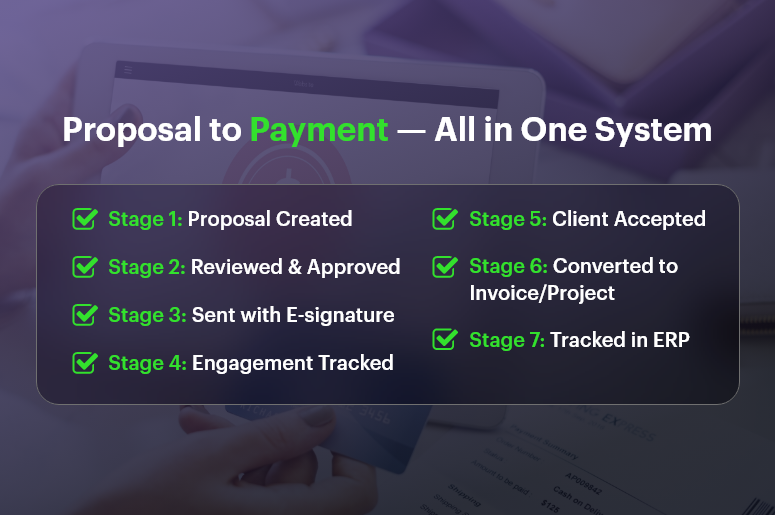Proposals are where deals get real. They’re not just paperwork — they’re your value, your offer, and your brand, packaged into one critical document. Yet too often, businesses struggle with outdated tools, scattered data, and approval delays that slow everything down. A weak or inflexible proposal module doesn’t just hurt productivity — it puts revenue at risk.
In today’s fast-paced, competitive sales environment, you need more than just templates and pricing tables. You need a smart, integrated proposal module that helps you generate accurate, branded, and trackable proposals in minutes — not hours. In this article, we break down the 7 essential features your proposal module must include to streamline sales workflows, improve accuracy, and boost your close rates. If you’re evaluating tools or looking to upgrade your current system, this checklist is your shortcut to smarter selling.

Why a Powerful Proposal Module Matters
Whether you’re in B2B services, construction, SaaS, or consulting, proposals are more than just quotes — they are sales assets.
Here’s what happens with an outdated or disconnected proposal process:
- Sales reps waste time creating proposals manually.
- Teams send inconsistent documents with errors.
- Approvals are delayed due to long email threads.
- Version control becomes a nightmare.
- Customers lose confidence and walk away.
These challenges don’t just slow things down — they directly impact your revenue and close rate.
A modern proposal module, especially when integrated into your CRM + ERP system like CRMLeaf, helps you overcome these hurdles with automation, consistency, and real-time visibility.
It gives sales teams the tools they need to:
- Generate branded proposals quickly
- Route them through internal approvals
- Track client engagement
- Convert proposals into orders or projects seamlessly
Now, let’s dive into the 7 features that make this possible.
Top 7 Features Every Proposal Module Should Have
1. Customizable Templates with Dynamic Fields
Why it matters:
Sales reps shouldn’t be designing proposals from scratch. A good proposal module provides pre-built, reusable templates that auto-populate key fields like client name, project details, pricing, and timelines.
This ensures consistency, reduces manual work, and eliminates human error — especially during busy seasons or when scaling teams.
2. Integrated Pricing & Product Catalog
Why it matters:
Manually entering prices is a recipe for mistakes. With an integrated pricing engine, your proposal module pulls live data from your product or service catalog, ensuring all quotes are accurate and up to date.
CRMLeaf connects your CRM and ERP pricing logic directly to proposals — so there’s no risk of quoting the wrong rate.
3. Automated Approval Workflows
Why it matters:
Sales proposals often need internal approvals — especially when discounts, custom terms, or special clauses are involved. Manual review chains slow things down and lead to missed deadlines.
With automated workflows, proposals get routed to the right people based on rules like deal size or department. CRMLeaf ensures speed without losing control.
4. Real-Time Version Control
Why it matters:
Clients request changes. Reps make updates. Suddenly, there are three versions of the same proposal floating around.
Your proposal module must allow version tracking with labels, timestamps, and change logs, so you always know which version is current — and why it was revised.
CRMLeaf gives your team complete visibility into the entire revision history, cutting confusion and errors.
5. E-signature Integration
Why it matters:
The longer a proposal sits unsigned, the lower your chances of closing. Adding built-in e-signature capabilities helps you eliminate friction and shorten the sales cycle.
CRMLeaf integrates with e-signature tools (or offers built-in signing options), allowing clients to sign directly from the proposal with full legal compliance.
6. Engagement Tracking & Alerts
Why it matters:
If you don’t know when a proposal is opened, forwarded, or ignored — you’re flying blind. Engagement tracking shows who’s reading your proposal, how often, and for how long.
This allows sales reps to follow up with perfect timing and relevant context. CRMLeaf alerts reps the moment a client engages with a proposal.
7. Seamless Conversion to Invoices or Projects
Why it matters:
Once a proposal is signed, the real work begins — billing, delivery, or project execution. A smart proposal module lets you convert approved quotes into invoices, tasks, or projects instantly.
CRMLeaf connects the full lifecycle — from proposal to payment — without switching platforms, saving time and improving client experience.
Customer Success
For example, SwiftTech IT Solutions, a fast-growing MSP based in Pune, struggled with manual proposals that took 2–3 hours to create and often included outdated pricing.
After implementing CRMLeaf’s proposal module:
- Proposal creation time dropped by 80%
- Approval turnaround improved by 65%
- Close rates increased by 28% within two months
They now use dynamic templates, auto-approvals for standard deals, and real-time engagement tracking to close deals faster — and with fewer errors.
Key Takeaways
Your proposal process is more than paperwork — it’s your first big promise to a client. If that process is slow, manual, or error-prone, it directly affects how fast and how often you close.
A powerful, flexible proposal module saves time, ensures accuracy, and gives your sales team the confidence to move quickly and win consistently.
With CRMLeaf, you don’t need separate tools for quoting, approvals, and invoicing — it’s all built into a single, streamlined platform that supports your entire sales lifecycle.
